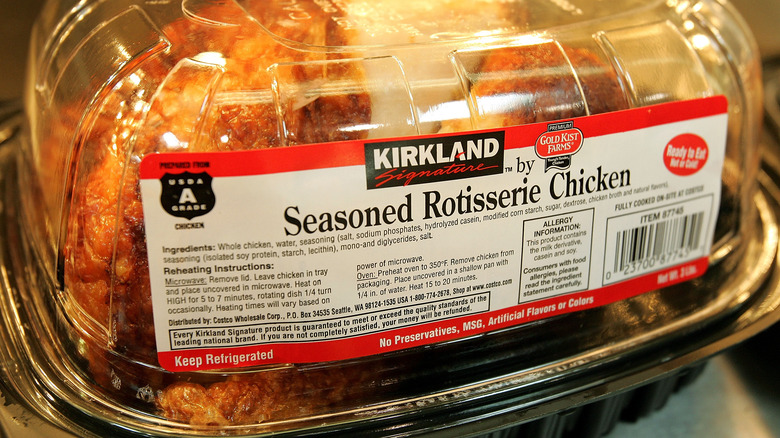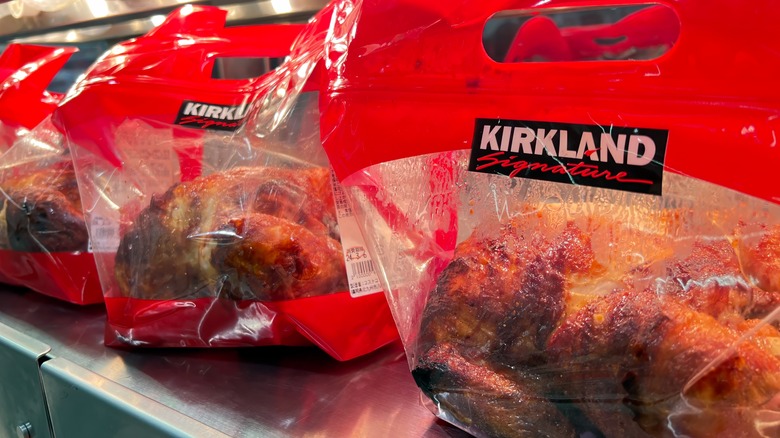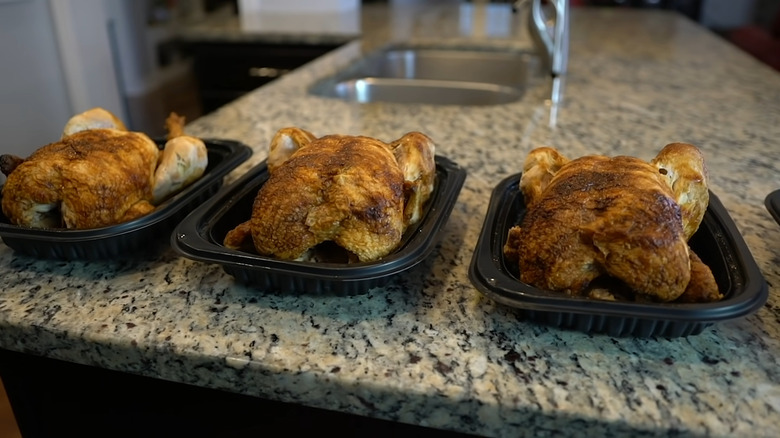Should You Worry About This One Ingredient In Costco's Rotisserie Chicken?
If you're a big fan of Costco's delicious rotisserie chicken, it may be the one thing (well, that and the cheap and tasty food court hot dogs, pizza, and froyo) that keeps you forking out that hefty membership fee year after year, particularly if you don't have a massive family and thus have no need for gallon jars of mayonnaise and cereal by the truckload. You may be surprised to hear, however, that this chicken contains a lot more than you might think it does ... and not in a good way. Nutritionist and food writer Robin Miller says there are 10 ingredients in one of these big birds, with the good news being that "you've probably heard of at least seven of them."
If you'd like to count for yourself, just check out a Kirkland rotisserie chicken label, which shows 11 ingredients (including water): chicken, water, salt, sodium phosphates, hydrolyzed casein, modified corn starch, sugar, dextrose, chicken broth, isolated soy protein lecithin, and mono-and-diglycerides. Six of these — including water — are things you might actually have in your kitchen. As Miller points out, this is actually not too bad for processed or prepared food, although it is five more ingredients than you'll need to make your own Costco chicken taste-alike at home. However, there is one particular ingredient here that might pose a problem for some people, and that's sodium phosphate, which can cause some major issues to certain organs.
Sodium phosphate has its hazards
Of the listed ingredients, the one Robin Miller expresses concerns about is sodium phosphate. She says this is used to prevent the growth of mold and bacteria, as well as to add texture and also to work as an emulsifier (something that helps to uniformly disperse the flavorings and other ingredients throughout the chicken). Miller warns, though, that "sodium phosphate has been linked to chronic kidney disease, even in folks with normal renal function," and Healthline adds that foods containing this additive should be avoided by anyone with kidney problems, bowel problems, intestinal tears/blockages, or heart disease.
While this additive is classified by the FDA as being "Generally Recognized as Safe" because the amount of sodium phosphate added to processed foods tends to be on the low side, it can be dangerous to even those without pre-existing conditions if they eat too much of it. Some of the side effects an excess of sodium phosphate can produce include vomiting, headaches, bloating, gut pain, dizziness, irregular heartbeats, and seizures. Whew! Think we'd all better take Miller's advice when she says to "limit our [sodium phosphate] intake from food sources" — so, no pigging out on an entire Costco chicken by yourself (at least not in one sitting).
The other additives aren't too bad
Miller does say, though, that the other additives Costco chickens contain are all "frequently used, FDA-approved ingredients" that are "mostly food-based." Casein, for example, is a dairy-derived protein and one that PloS One says has been linked to increased metabolism and weight loss in mice. (Useful information if you're ever plagued with chubby rodents.) Soy protein lecithin comes from soybeans, of course, but the Food Allergy Research and Resource Program at the University of Nebraska-Lincoln says that the trace amounts contained in most foods with this additive will probably not pose a problem to the soy-allergic.
Miller's overall opinion is that Costco's $5 chicken is relatively okay and even kind of healthy since it's "low in calories, low in fat (if you dodge the fatty skin), high in protein, rich in nutrients, and gluten-free" as well as being " not too bad in the sodium department, either," at least when compared to other prepared foods. So there you have it, the nutritionist's seal of approval on your favorite baked bird, as long as you can exercise a little restraint.


